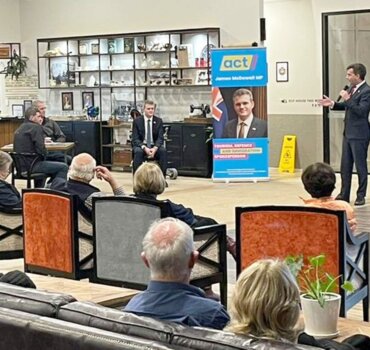
ACT leader David Seymour at last week’s public meeting at Te Awa Lifecare Cambridge.

ACT leader David Seymour at last week’s public meeting at Te Awa Lifecare Cambridge.
Locals attending ACT Party leader David Seymour’s ‘Real Change’ public meeting in Cambridge last week expressed a range of concerns including co-governance, soaring living costs, growing migration numbers and declining education standards.
The meeting at Te Awa Lifecare was the second in ACT’s 14-day, 13-stop Real Change Tour aimed at hearing the aspirations of different communities. It drew around 200 people, roughly the same as at the first stop in Napier.
He spent time in Cambridge with Waikato based ACT MP James McDowall.
Seymour said his party wanted to formulate an action plan that fits the hopes of ‘those who are paying the bills’.
“Right now, the direction of the country is not aligning with their hopes and dreams, even if they are paying the bills,” he said. “The coming election will be a change election… that is why we are going around the country, why we need to find out what is important in different areas.
“We want to see a change of government, and make sure it’s a government of real change. Our concerns are policies and direction. We cannot have another cycle of Bolger, Clark, Key and Ardern, and roughly the same stuff happening. If it does, we may end up poorer, more divided and unsafe than anyone who grew up here thought possible.”
Attendees raised issues around housing, manufacturing and primary industries, crime, immigration and staffing shortages.
Seymour said while ACT championed the Treaty of Waitangi, Labour’s push towards dividing the country into “two groups of people” – tangata whenua and tangata tiriti – ran counter to the efforts of many over several hundred years to ensure each individual remained free and equal.
He said the Government’s Three Waters plan made no sense.
“It requires four or five layers of governance and that isn’t going to work.
“The concept that you get seats at the table based on tangata whenua or tangata tiriti is not just a bad idea, it’s a positively dangerous one. All our ancestors were entrepreneurial enough to give everything up to come here for a better future. That is what defines us as New Zealanders. What is being proposed is totally inconsistent with that.”
He described co-governance as ‘dangerous and divisive’.
Concerns around rising levels of crime, increased cost of living and declining standards of education were a potent force driving growing migration numbers, he said. At the current rate, up to 100,000 were likely to leave a year, with up to a million believed to be considering leaving.
ACT would bring back charter schools and bring the education system back to a knowledge-based curriculum, he said. It would also repeal Three Waters and turn the immigration service role into one more akin to ‘recruitment agent rather than security guard’.








